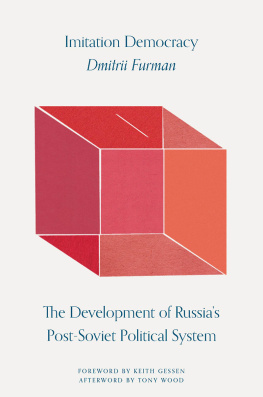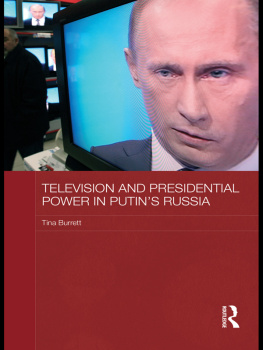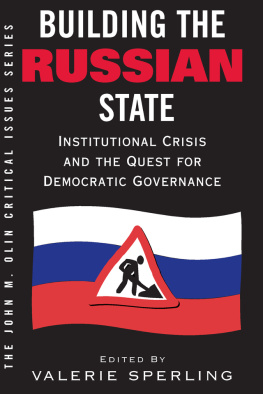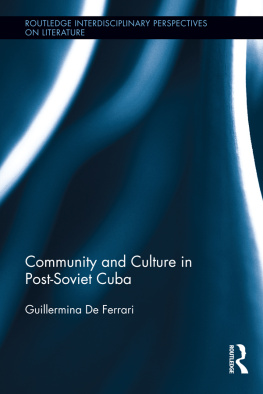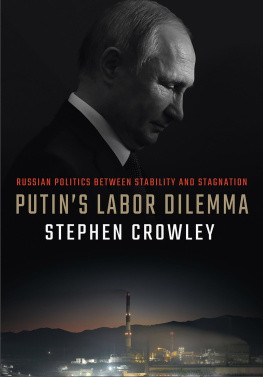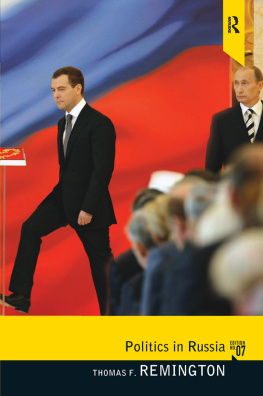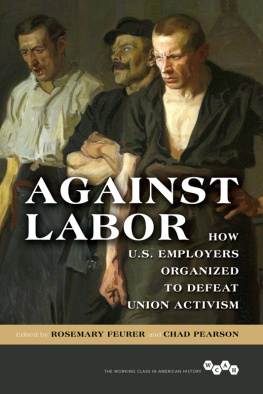First published 1996 by Westview Press
Published 2018 by Routledge
711 Third Avenue, New York, NY 10017, USA
2 Park Square, Milton Park, Abingdon, Oxon OX14 4RN
Routledge is an imprint of the Taylor & Francis Group, an informa business
Copyright 1996 Taylor & Francis
All rights reserved. No part of this book may be reprinted or reproduced or utilised in any form or by any electronic, mechanical, or other means, now known or hereafter invented, including photocopying and recording, or in any information storage or retrieval system, without permission in writing from the publishers.
Notice:
Product or corporate names may be trademarks or registered trademarks, and are used only for identification and explanation without intent to infringe.
Library of Congress Cataloging-in-Publication Data
Connor, Walter D.
Tattered banners : labor, conflict, and corporatism in postcommunist Russia / Walter D. Connor
p. cm.
Includes bibliographical references and index.
ISBN 0-8133-2911-6ISBN 0-8133-2912-4 (pbk.)
1. Industrial relationsRussia (Federation) 2. Industry and stateRussia (Federation) 3. Russia (Federation)Economic policy19914. Russia (Federation)Politics and government1991- I. Title.
HD8530.2.C66 1996
331.0947dc20 96-7425
CIP
ISBN 13: 978-0-8133-2912-3 (pbk)
This book was designed and typeset by Letra Libre, 1705 Fourteenth Street, Suite 391, Boulder, Colorado 80302.
THIS IS A WORK ABOUT A TRANSITIONAL PERIOD, researched during transitional times and written necessarily in a transitional style. There are massive discontinuities between the politics, economics, and social life of the old USSR and the states into which the Soviet Union split at the end of 1991. But there are continuities as well between the old Moscow-centered megastate and what is now variously labeled the CIS (Commonwealth of Independent States), the FSU (Former Soviet Union), the newly independent states, or, simply, Eurasia. Economic priorities pursued for generations, habits of thought and behavior produced by the old system, and webs of connections formed individually and collectively in the Soviet period constitute a heavy legacy. All the former Soviet republics are in transition; not all are on the same trajectory. Russias transition is in sheer scale different from the rest.
If Russia today is a mix of old and new, so is the approach taken here. Those of us formed in the old business of Soviet studies, whether in academia or government and in whatever original disciplinary affiliation, have been subjectedand have subjected ourselvesto a good deal of criticism in recent times. The object of our study, launched by the late 1980s on a path of reforms hitherto unthinkable, collapsed an outcome unforeseen by analysts in large part but similarly unapprehended by the reformers who were the agents of Soviet disintegration. No doubt much of the criticism is deserved. Yet throwing away the accumulated perspectives of some decades would be an overreaction. Sovietology understood a great deal about the old USSR, whose shadow still casts itself over the present. Prediction is a tough business; predicting the great (and therefore discontinuous) events is all the tougher. The best of social science, applied in particular national contexts, would be unlikely to significantly better Sovietologys score in this regard.
Still, any work written at this time that engages the post-Soviet present and future must concern itself with concepts, images, and organizing ideas. This is true both for works that aspire to be theoretical and for those, like the present one, that set out different aims.
Thus, the first chapter deals with conceptualizationsof what the old USSR as a political system was and of what the Yeltsin governments attempt to craft a new Russia, politically and economically, amounts to. It deals with the totalitarian model and what it may tell us, looking backward, about the sources of the USSRs decomposition. It engages aspects of discussion and speculation about democratic transitionsfor some years now a growth industry in political science. Democratic transition studies are driven by the encouraging emergence of new democratic polities in the earlier exceptional political orders of noncommunist Europe (Spain, Portugal, Greece) and of authoritarian Latin America and have recently been confronted with new raw material in the emergence of the former USSR and Eastern Europe from communism. It deals as well with corporatism as a mode of controlling and coordinating diverse political and economic interests; it was a variety of corporatism that Russia chose in late 1991 to regulate its own anticipated problems in government-employer-labor relations.
This book, however, is not primarily intended or written as a conceptual work. I am impressed with Russias particularity. Particularity is not uniqueness; in a trivial sense at least, every country is unique. But Russias particularity is oversized, large-scale, multifold, embracing elements of Soviet and pre-Soviet heritage: the Byzantine-Orthodox cultural-religious provenance; the early (by European standards) centralization of the state via the Tatar domination and its heritage in Muscovy; the early emergence of autocracy and with it a massive barrier to the development of any real class system; the Eurasian expansion; and the critical role of the state in driving economic development under late tsarism and, massively expanded, under an explicitly antimarket Soviet regime. Finally, the transition from communism involved not only a regime change that operated differently from those in the external empire, but the dissolution of the Soviet Union itself and the even older political-territorial links joining the East Slav lands. Thus, the emergent Russia was smaller than it had been for over 300 years.
Attitudes: Russia in the Mind
Fascination with the particularity of a country does not mean attraction to, or moral approval of, the objectwhether the political system or the underlying culture and society. There was nothing attractive in the USSRs monstrous political system, and rare were practitioners of Sovietology in the English-speaking world who could have been called pro-Soviet. (The systems propagandists thus responded in kind over the years to our bourgeois falsifications.) But analysts were somewhat divided, if not explicitly, on another point: the nature of what lay under the statethe society, the cultureand how to react to it. This was a matter of emotion as well as of intellect. Some liked what they saw as the real Russia, sympathized with it, and felt engaged on its behalf while rejecting the political system that stood above it.
Others reacted somewhat differently. Although not unsympathetic, not disinclined to see the people as victims, they tended to stress the duration and depth of regime (tsarist absolutism, Soviet totalitarianism) impacts on society. On the whole, Soviet society did not look like a Western, or central, European society under a mode of rule culturally and historically alien to it. The experience since 1917 had been crucial. The project of building a new Soviet man might have failed, but the system had formed the Soviet people in a mix of fear, dependency, parochialism, and ignorance.


